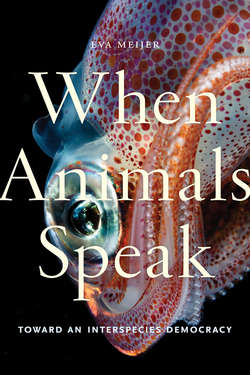Читать книгу When Animals Speak - Eva Meijer - Страница 11
На сайте Литреса книга снята с продажи.
Theorizing from the Ground Up: A Note on Method
ОглавлениеUntil now, the political turn in animal studies has primarily been advanced by philosophers and political theorists working in the tradition of Anglo-American analytical liberal political philosophy (i.e., Cochrane 2012; Donaldson and Kymlicka 2011; Garner 2013; and O’Sullivan 2011). In this book, supported by empirical ethological studies, I bring their ideas into conversation with insights from other philosophical traditions, most notably phenomenology and post-structuralism. I do so because I do not simply defend the view that we need to take animal voices into account politically. This project is also an investigation of what concepts such as “language” and “politics” mean and could mean in relation to other animals, and how they have been constructed. We need to do both because non-human animals have been excluded not only from our political communities, institutions, and conversations, but also from the concepts we use to describe and think about them.
Language is a good example of how this works. Other animals have been excluded from this concept from very early on in Western traditions of thinking. As discussed above, Aristotle famously separated human language from non-human animal use of voice, thereby drawing boundaries around “language” and the political community in one movement. This is not a neutral or natural step: unequal power relations play a role in this process, and we could even say that our view of language has been constructed by excluding other animals. In order to develop a theory of non-human animal and interspecies languages, we cannot, therefore, simply draw on ethological research that investigates the linguistic capacities of other animals and say that other animals “have” language; we also need to investigate how this concept was constructed and how it is used and has been used in relation to other animals. This critical investigation can function as the basis for developing a new phenomenological understanding of language together with other animals. As I argue in more detail below, insights from different traditions can shed light on different aspects of this question.
Recognizing the role that power relations play in constituting the meaning of concepts also has consequences for the political philosophical standpoints adopted in this book. My phenomenological approach to political concepts can perhaps best be described as “from the ground up,” meaning I start with non-human animal agency and interspecies relations, as described in the case studies and other examples I use, as the basis for the development of my philosophical views. I do not, for example, start from the basic principles of liberal democratic theory and then argue for including non-human animal interests; rather, I evaluate the relevance of concepts such as citizenship, sovereignty, or deliberation through the lens of non-human animal agency and interspecies politics. Rights, and other liberal democratic institutions, practices, and processes, may play a large role in improving the lives of other animals, and a critical investigation of these can lay the foundation for new interspecies relations. However, as I discuss in more detail in the second part of the book, while rights and other human inventions can be important stepping stones towards better relations, they cannot be the final goal. It is not up to humans to come up with a full political theory into which other animals fit; to do so would be to repeat anthropocentrism (see also chapters 1 & 8). Just relations can only ultimately come into being through interaction with other animals.
Theorizing from the ground up also means that these explorations are rooted in a liberal democratic reality. This is relevant from a material point of view because existing institutions, rights, and practices can be changed to better incorporate animal voices, and this would make a significant difference for many non-human animals. Theoretically, it is also important to start with existing situations in order not to make universal or metaphysical claims about other animals; this would again be a matter of humans deciding what is best for other animals without consulting them. Just as with language, however, while rights and other liberal democratic institutions and practices carry a promise of justice and can make a difference for many non-human animals, one must remain critical of the system in which they are grounded, and bring to light the power relations that helped to create them. This is especially important in the case of non-human animals, who were not just excluded from rights by accident, but were seen as the “other” in relation to which “the human” was constructed (chapter 1, Derrida 2008). In order to move beyond that and conceptualize new futures, we must learn from other animals and from non-Western human cultures (Ko and Ko 2017).
In this book, I therefore discuss existing concepts from different theoretical angles, rooted in existing practices, and explore how we can use these as tools to begin thinking and acting differently. Because thinking and acting differently will need to happen in an interspecies context, and because we do not know how other animals will act once they no longer need to fear humans, the outcome of this is unclear. As Hannah Arendt shows ([1958] 1998), this is also where we find hope.
